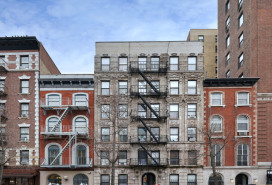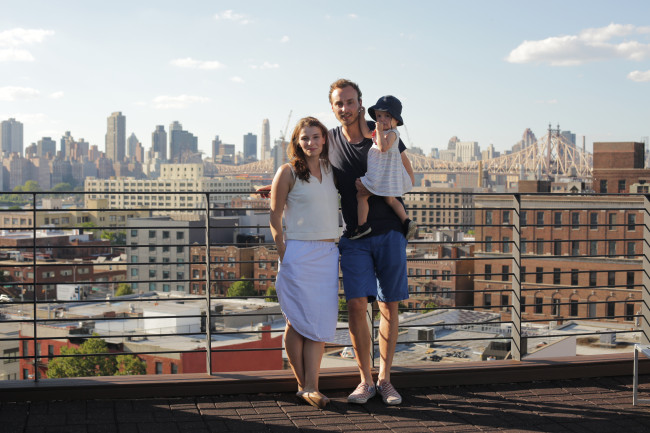The peripatetic New Yorker: Why are city dwellers so nomadic?

The path I've traced through New York so far has snaked from the East Village to Greenpoint to Woodside to one corner of Astoria and then another—with a three-year break overseas in between. Five moves in seven years have taught me a few tricks: Wrap fragile items in linens, purge your closet mercilessly, and if you can afford it, hire movers. But for the most part, the experience has consistently remained an angst-ridden one.
Moving is miserable, we all know. Seeing the trappings of your life reduced to a tower of boxes, which you then must schlep across town, where you face a trying period of readjustment to your new surroundings, can be a harrowing experience. No wonder relocation ranks among life’s top stressors.
None of this seems to faze renters in NYC, though, many of whom seem to be as peripatetic as I’ve been. Last year, Crain’s reports, 55,211 people moved to the city, and while there’s no hard data on how often residents move within the five boroughs, anecdotal evidence suggests that many of us are perpetually on the hunt for our next place. A New York Times story features several of the “serial renters” who uproot themselves on a yearly basis; in a single month in 2015, according to Bloomberg, more than a thousand new apartment leases were signed in Brooklyn by renters in search of better deals.
Roommating means relocation
Stephanie Diamond, creator of The Listings Project, a free weekly email of real estate and opportunities listings for artists that started in 2003, says that as she has curated the listings over the years, she’s noticed that New Yorkers seem particularly open to frequent relocation.
That many New Yorkers save cash on exorbitant rental costs by living with roommates (even—gasp—in their 30s!) can also mean more relaxed lease terms, making it easier to be nomadic, Diamond observes. “More and more, I’ve been seeing listings that are for sublets with an option to renew if the roommates get along,” she says. “People are getting more savvy about making that commitment to living somewhere, and are trying it out first.”
Rory Bolger, an agent with Citi Habitats—who himself has moved nine times in 12 years—agrees that the increasing prevalence of apartment sharing plays a major role in how often New Yorkers relocate. In the past, he says, it was typical for college grads to share their first NYC apartments with roommates, but today, it’s a widespread practice with older professionals, too.
“Rents have risen so much that the ability to grab your own studio at a price that's affordable is not easy to do,” Bolger says. “It’s become more accepted to live with roommates—people are coming in from all over the country and like the experience of sharing common spaces with one or two other people.”
This can also mean that several moves within your first few years in NYC is to be expected, Bolger observes. Lifestyle changes, like a pay increase at work, might prompt people to relocate to their own apartments, or to more luxurious shares.
Relationships can lead to frequent moves
Finding a significant other is another factor: Bolger has noticed that New York couples often shack up quickly as a cost-saving measure. “A lot of young people might be more apt to move in with their significant other faster than they would in another city to make it affordable,” he says. “It might go against intuition but it comes down to brass tacks: How much we can save living together?”
The Observer recently explored this phenomenon: Rather than being a sign of the progression of a relationship, Margaret Abrams writes, moving in together often means "that you can’t afford the apartment of your fantasies, without the help of someone else." The article includes a horror story of a too-soon cohabitation, but the Gothamist, in its "Ask a Native New Yorker" series, heartily endorses the practice as a foolproof way to save on rent.
Diamond also notes that priorities can change the longer you’ve lived in NYC. “I think when we are young and first moving to New York, we're cool with certain places we wouldn't want to live in when we're older. We deal because we want to be there, so we're willing to compromise majorly,” she says.
In addition to developing higher standards of living, as people get to know New York better, they may realize that certain neighborhoods are better suited to them than others—and they might age out of places, too. (The East Village, with its abundant bars and clubs full of young people, was a great fit for me when I was fresh out of college; now, I prefer the more relaxed pace of Astoria, which feels like a tight-knit community.) “There’s a lot of trial and error,” Bolger says, who has lived in Hell’s Kitchen, the Upper West Side, Greenwich Village, and Boerum Hill (among others).
He recalls moving to Brooklyn from Manhattan for the first time: “I quickly appreciated things that were very different about neighborhoods in Brooklyn,” he says. “Many of the people were true locals who were born and raised in the area, and there were more conversations happening because everyone wasn’t moving as fast as they are in Manhattan.”
The downsides of the nomadic life
Getting to know the city better and experiencing its range of neighborhoods is an advantage of moving, but there are distinct downsides that go beyond the hassle of packing. The Furman Center found in its 2015 State of New York City’s Housing and Neighborhoods report that households that have recently moved within NYC are paying significantly higher rents than those that have stayed put.
Shannon Moriarty, the Furman Center’s communications director, explains that median rents across all boroughs are costlier for people who have moved in the past five years. “Citywide, median monthly rent in 2014 was $1,278, while recent movers’ median monthly rent was $1,622,” she says. “In Manhattan the difference was especially stark: Median monthly rent in 2014 was $1,533, while median monthly rent for recent movers was $2,143.”
The Furman Center found that NYC rents have steadily risen every year since 2005. That fact, coupled with demand for housing outpacing supply, means that when you move, there’s a good chance you’ll be paying more than before. Those who remain in one place, on the other hand, may be able to lock in lower rents, especially if they’re in a stabilized building. And sometimes, moving simply isn't an option. For New Yorkers who are on fixed incomes and in stabilized apartments, for instance, relocating would mean facing a stratospheric jump in rent, so instead they stay and put up with less-than-ideal conditions. (Previously, Brick spoke to tenants in rent control apartments who recounted having to purchase their own appliances and contend with rundown, decades-old housing.)
Apart from financial reasons, there are major psychological disincentives to moving. "Change in residence" ranks among the 100 stressors on the Holmes and Rahe Stess Scale, which measures the toll different life events can take on one's health. In this Times article, for instance, psychologists describe relocation as potentially gut-wrenching, stirring up feelings of loss, fear, and loneliness.
In the past 5 years, how many times have you moved within NYC?
Despite this major disadvantage to moving, a poll conducted by Brick revealed that while many New Yorkers are staying put—a quarter of respondents said they hadn’t moved at all in the past five years—more have relocated at least once, and 20 percent have moved four times or more.
What was your main reason for moving?
Brick readers’ reasons for moving reflected the shaky ground upon which NYC tenants often stand. Although the most commonly cited reason for relocating was finding a better quality apartment, nearly 10 percent of respondents said they were priced out of the neighborhood where they were living. One responder wrote that their landlord had to sell the building due to personal problems, and bought them out.
Where did you move most recently?
Interestingly, the poll reveals that when New Yorkers do move, it’s often a significant distance—over 40 percent of respondents said they moved from one borough to another. The major lifestyle change that comes with borough-hopping may be part of the appeal, Bolger says: “Moving is stressful, but at the same time we’re used to living with stress in the city. Relocating can also be exciting and fun.”
You Might Also Like

























